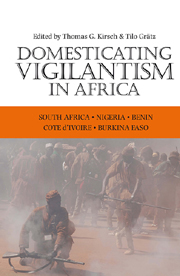Book contents
6 - Violence in the Name of Democracy
Community Policing, Vigilante Action & Nation-Building in South Africa
Published online by Cambridge University Press: 05 April 2013
Summary
Introduction
There is something disturbingly ironic about the fact that in recent decades sub-Saharan Africa has witnessed ‘a remarkable number of transitions to democracy’, while at the same time many ‘societies on the African continent have experienced major crises of violent conflict, war and genocide’ (Kaarsholm 2006: 1). Though the increase in vigilantism in many countries in Africa is not a new phenomenon, it forms a part of these developments. Pratten remarks, for example, that the ‘emergence of night guards and vigilante groups as popular responses to theft and armed robbery has a long and varied history in Nigeria. Since the return to democracy in 1999, however, Nigeria has witnessed a proliferation of vigilantism’ (2008: 1). In present-day South Africa too, where crime is widely considered to be a ‘primary symptom of a new democratic era’ (Hansen 2006: 280), for a number of years the transformation to an inclusive democratic system coincided with increased incidence of acts of popular justice which ‘threaten[ed] the precarious South African miracle’ (Jensen 2007: 48).
However, the relationship between ‘vigilantism’ and ‘democracy’ certainly does not follow a unidimensional logic, since both notions are multifaceted and protean. The difficulties in defining ‘vigilantism’ have been discussed in the introduction to this volume and do not need to be recapitulated here.
- Type
- Chapter
- Information
- Domesticating Vigilantism in Africa , pp. 139 - 162Publisher: Boydell & BrewerPrint publication year: 2010

